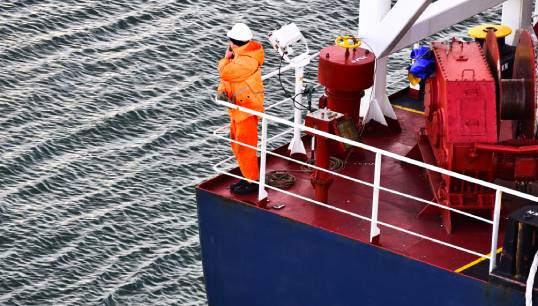- Topics
- Campaigning
- Careers
- Colleges
- Community
- Education and training
- Environment
- Equality
- Federation
- General secretary message
- Government
- Health and safety
- History
- Industrial
- International
- Law
- Members at work
- Nautilus news
- Nautilus partnerships
- Netherlands
- Open days
- Opinion
- Organising
- Podcasts from Nautilus
- Sponsored content
- Switzerland
- Technology
- Ukraine
- United Kingdom
- Welfare
Shipowners urged to do more for the psychological wellbeing of seafarers
27 July 2023

Maritime medical experts have urged shipowners to do more to care for the psychological wellbeing of crew members after a study found that more than one-third of seafarers have experienced traumatic incidents onboard their ships. Andrew Linington reports
Research conducted among 115 Polish seafarers found that 36% had witnessed a traumatic event during their career and a similar number reported having frequent nightmares or 'intrusive thoughts' – both symptoms of post-traumatic stress disorder.
The study – carried out by the Institute of Maritime and Tropical Medicine in Gdynia and the Medical University of Gdansk – was based on an analysis of key health indicators and harmful psychosocial factors in the work of seafarers, as well as an examination of their strategies for coping with stress.
Researchers found that 70% of the seafarers worked more than 55 hours a week and 45% get less than seven hours of sleep a day while at sea, compared with only 20% while ashore.
The study – reported in the latest issue of the International Maritime Health journal – also found 'a positive relationship between exposure to a traumatic event and nightmares and intrusive thoughts, as well as between shorter sleep at home and exposure to a traumatic event'.
Fewer than half the seafarers exercise to the level recommended by the European
Society of Cardiology – five times a week for a minimum of 30 minutes – while at sea; and around a half fail to eat the recommended amounts of fish and dairy products.
Around 13% of the surveyed seafarers said they had experienced discrimination at least once during their career – either on the grounds of age, gender or race.
Researchers said such harmful psychosocial factors create 'significant psychological burdens' upon seafarers – which may pose a direct threat to their health and safety and may be linked to evidence of high suicide rates.
The high rates of shift work and night work among seafarers may also result in 'occupational burnout', the report adds.
Researchers suggested the Maritime Labour Convention should be beefed up to ensure that shipowners provide free internet connectivity, noting that this would reduce the isolation seafarers experience and improve their quality of life onboard
The medical experts said shipowners need to introduce a number of measures to reduce these risks, including planning voyages and port calls to minimise the need for night work and working weeks over 55 hours.
'It would also be beneficial to organise the work in such a way that the shifts lasted 12 instead of six hours where possible – for example during often multi-day stopovers in the roadstead,' the report adds.
Researchers suggested the Maritime Labour Convention should be beefed up to ensure that shipowners provide free internet connectivity, noting that this would reduce the isolation seafarers experience and improve their quality of life onboard.
'Due to the frequency of occurrences that may cause PTSD, it seems reasonable to introduce an obligation for the shipowner to provide psychological or religious assistance to the crew (depending on the crew's needs and the cultural context) after a trauma, sudden death or a serious accident on board, in order to reduce the risk of psychological or psychiatric complications,' the report adds.
'Alternatively, we can consider training for the crew about coping mechanisms and strategies for stressful situations and training in interpersonal communication to reduce the stress level.'
Tags
More articles
Future-proofing seafarer skills in Europe
Enhancing human rights at sea
Maritime cadets offered virtual conference experience on wellness at sea
Sailors' Society is expecting more than 6,000 students to benefit from its global 2023 Wellness at Sea Maritime Schools' Conferences, and this year it has virtual events planned for the first time for the UK's maritime colleges.
